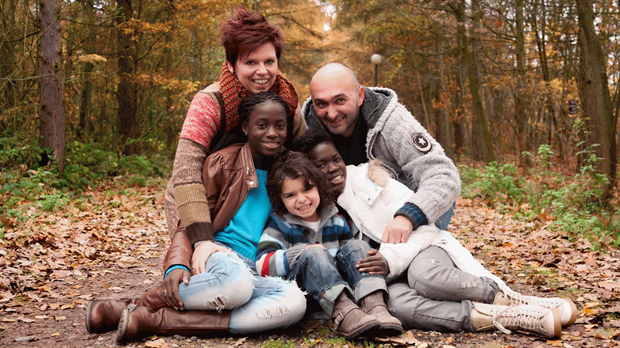From Foster to Forever

As program director for Focus on the Family’s Adoption & Orphan Care Initiative, Sharen Ford has a deep and abiding passion for seeing kids in families. Whether through foster care or through adoption for those who have lost their families, she challenges the church to consider our calling. Today’s Christian Woman talked with Sharen to hear more.
What makes families so important for kids who are in foster care or available for adoption?
Kids need families because no man is an island. We need people who will support us in growing and learning and in our highs and our lows, and families do that for one another. Families are accepting and giving and caring and just there. And if kids don’t have families, then what do they have? It’s one thing to be alone because you choose to be alone; it’s another thing to be alone because you have no one. Kids who come through our foster care system are coming from hard places, and they need someone who will be there for them—that ear, that voice, that pat on the back.
So what kind of family do foster children need?
Individuals thinking about being foster parents need to be flexible people who are good listeners and who are teachers. Kids in foster care have often missed educational opportunities or developmental opportunities, so foster parents are teachers who teach them how to be a kid, how to wash dishes, how to take care of themselves in positive ways; people who are an advocate for them in the school system, in social environments; people who just have the capacity to love.
Can you describe the need for foster families in the United States?
There are 400,000 kids across the U.S. who are in the foster care system today. There is a need for foster-care families who can take just one child or sibling groups. Children shouldn’t have to be separated from their biological siblings because there is not a foster home that can take a sibling group of four or five or even six kids. We have sibling groups that are even as large as eight kids. We need homes with the capacity to take all of those kids together when there’s no other reason to break them up. The foster care system needs families who can take medically fragile children or children who have medical complications. They need to be willing to take some classes and get new information on how to take care of a child who may need to have shots at home or has a health problem or eating challenges.
It sounds as if the need is pretty great and significant. How have you seen foster families change the trajectory of children’s lives?
I have seen children who have been withdrawn and unengaged just begin to blossom and flower. Children who have come in as failure-to-thrive children because they weren’t being appropriately stimulated or appropriately fed—when they get into an environment that’s nurturing and caring, they begin to gain weight and start meeting their developmental milestones. I’ve seen children who people thought were educationally delayed but really didn’t have developmental disabilities. They just didn’t have the right stimulation and support to help them meet those educational milestones. They begin to change and engage in school and do their homework. They were on a special educational track, and they’re able to leave that track and be mainstreamed into the classroom. [I’ve also seen] children who were on meds who were able to be stepped down from meds because the home had the right structure and support.
How have you seen adoption from the foster care system make a difference in children, in families, in churches, and in communities?
I’ve seen kids who realized that they weren’t ever going to go back home be able to breathe again, and I mean breathe in a different way. It’s like: “Somebody wants me; I’m not second class; I’m not the leftover; I now belong to this family. I want to change my last name. They accept me for who I am.” I’ve seen kids who thought nobody wanted them, at 16 and 17 years old, get adopted and it’s like, “I’ve waited a lifetime for somebody to say, ‘You’re mine.’” I’ve seen kids wait until after they turned 18 to get adopted because of some other circumstances in the system. They got adopted technically as adults, and they’ve said: “I now have my mom, my dad. This is my family; they wanted me.”
What’s unique about an adoption through the foster care system?
think the piece that is unique about foster care is that there is that initial period where children are in foster care and the goal is to get them back to their biological family. And so the family who is initially fostering them is helping in the process of that reunification, supporting the child and helping them deal with their issues if they have them, or their hurts, and helping to be the bridge to help parents get their kids back. And then if that family has the capacity and is willing to, and God says the same, they may become the forever family for that child because they can’t go back home.
I think you have to be called to be a family that adopts from the foster care system if you were the foster parent and you’re now the adoptive parent. There is so much unknown when you do international adoption, or an infant adoption, but in the foster care system, you’re going to know a whole lot of information about that child, as much as the agency knows, and you’re going to know about that first family and their stuff as well. It’s different, but I think having information helps you make an informed decision.
What are some of the challenges that come from building a family by adoption through the foster care system?
When I’ve talked with people about why they chose to go international versus domestic, infant versus foster care, I think there’s something about not running into that first family at the grocery store or in the library; they’re not going to just show up. There is this fear factor for some families, the “what-if?” If you’re adopting across the water, that family is not going to just show up. They don’t know where you live, and that is a comfort for some families.
You know, some children have a trauma history. When they get stuck in trauma, it affects them educationally and behaviorally, so you’re going to have to be willing to invite and utilize the support that will help you and your child deal with having a background of trauma. Our children in the foster care system have seen and experienced things that a child otherwise wouldn’t have. Children deal with that trauma at every developmental stage until they work through it. Families need to be willing to utilize all the supports that will help them help their child and help them grow through it.
What’s the church’s role in foster care?
The church has a wonderful opportunity to minister to children. There are more than 102,000 children across this nation today waiting for their forever families, legally free for adoption, and the church can be a family for those kids.
The ministry here at Focus on the Family’s Adoption & Orphan Care Initiative is looking at the church to do two things. First, if God is calling your family to adopt from the foster care system, that you would do so. Second, for all the families who have adopted, here’s an opportunity for the church to provide post-adoption support, to wrap around those families who adopt. Focus on the Family can help them do that.
Amy Simpson is editor of Christianity Today’s Gifted for Leadership, Senior Editor of Leadership Journal, a speaker, and a Co-Active personal and professional coach. She’s also author of the award-winning Troubled Minds: Mental Illness and the Church’s Mission (InterVarsity Press). You can find her at AmySimpsonOnline.com and on Twitter at @aresimpson.
Read more articles that highlight writing by Christian women at ChristianityToday.com/Women
 Read These Next
Read These Next

 Examining Adoption EthicsThe Adoption Crisis, Part 1Let’s work together to protect children, birth families, communities, and the kingdom.
Examining Adoption EthicsThe Adoption Crisis, Part 1Let’s work together to protect children, birth families, communities, and the kingdom.

 Fall-Apart MomentsParenting inevitably leaves us discouraged, empty, and grasping . . . but maybe that's a good thing.
Fall-Apart MomentsParenting inevitably leaves us discouraged, empty, and grasping . . . but maybe that's a good thing.








 Homepage
Homepage